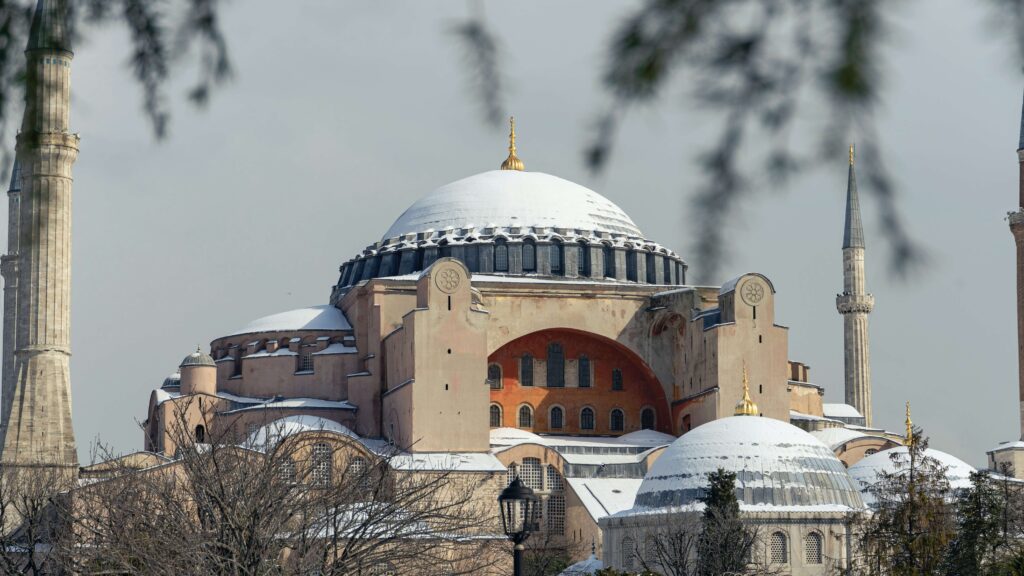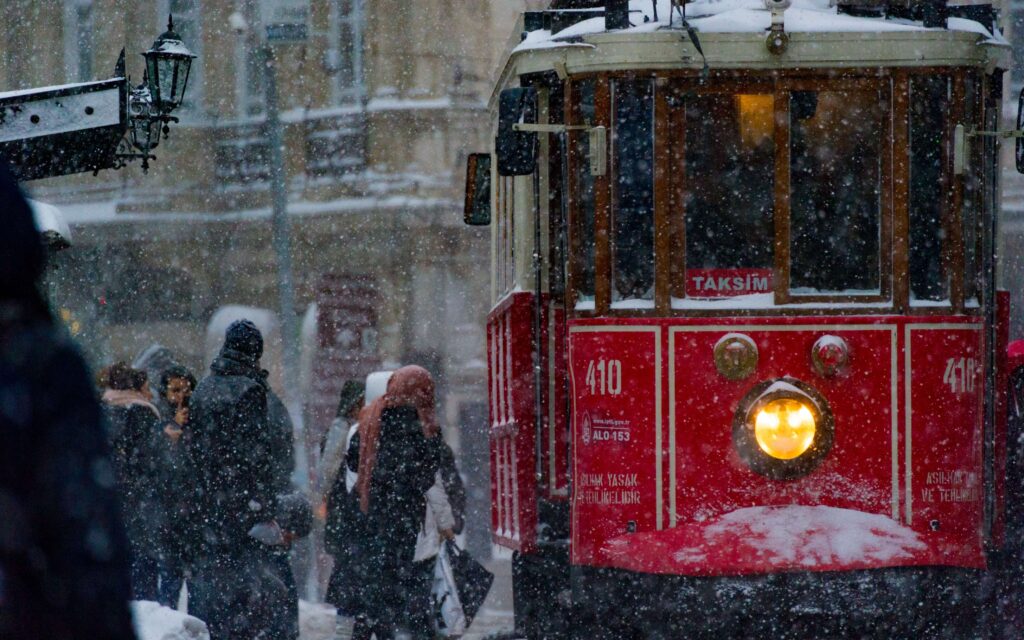Does It Snow In Istanbul, Turkey? Everything You Need To Know About Snowfall In Istanbul
If you’re planning a winter trip to Turkey, chances are you’re wondering, “Does it snow in Istanbul?”
The short answer is yes, it does snow in Istanbul. In fact, Istanbul is the snowiest city in the Mediterranean. But, just because it does snow in Istanbul doesn’t mean that it will snow in Istanbul. So don’t let the prospect of snow deter you from visiting Istanbul in winter. The city is a great destination to visit year-round. There are many things to do in Istanbul when it snows, including visiting a teahouse for a warm Turkish beverage.
In this post, I’ll cover everything you need to know about snow in Istanbul and all its pros and cons when planning your visit.
Please note this post may contain affiliate links. If you click on one, I may earn a small commission at no extra cost to you. See my Privacy Policy for more information.
How often does it snow in Istanbul?
Though it does not often snow in Istanbul, the city usually receives one or two snowfall events each year. On average, it snows in Istanbul 7 days each year. Most of this snowfall occurs in the months of January and February.
The amount of snow that falls is usually minimal and tends to melt quickly. However, this can vary depending on the year and the specific weather conditions. In some years, there may be more significant snowfall, while in other years there may be none at all.

When does it snow in Istanbul?
When it snows in Istanbul can vary from year to year depending on weather patterns and temperature fluctuations.
Istanbul typically experiences snowfall in the winter months, between December and February. On occasion, it may also snow in November or March. However, the majority of snow falls in January and February.
How much does it snow in Istanbul?
On average, Istanbul receives 1.9 inches (49mm) of snow per year. Compare this to the 23.9 inches (606 mm) average annual rainfall in Istanbul.

How cold is Istanbul in winter?
One reason Istanbul doesn’t receive much snowfall is that the city experiences relatively mild winters.
The climate in Istanbul is borderline Mediterranean, which means that, despite it getting cold in the winter, it mostly rains. However, temperatures in Istanbul do occasionally dip low enough to turn rain into snow.
| Month | Average High (F) | Average Low (F) | Average Snowfall (in) | Average Rainfall (in) |
| December | 51.3 | 45.9 | 0.28 | 2.05 |
| January | 47.3 | 41.5 | 0.94 | 1.93 |
| February | 49.5 | 42.8 | 0.59 | 1.46 |
| March | 53.2 | 45.3 | 0.12 | 1.5 |
As you can see from the above table, the temperatures in Istanbul rarely fall below freezing. Because of this, most precipitation occurs in the form of rain. So, if you’re thinking of visiting Istanbul in the winter, don’t let the snow be a deterrent for you! (And pack an umbrella.)

Where does it snow in Istanbul?
Istanbul’s hilly environment and maritime position cause microclimates within the city. This means it’s more likely to snow in some parts of the city than others.
North-facing districts are the most likely to get snow. These areas are prone to the lake effect in which cold airs blow in from Siberia and across the Black Sea. Higher elevations are also more likely to get snow.
Does it snow in Istanbul in November?
While not a winter month, it does sometimes snow in Istanbul in November. On average, it snows less than one day in the month of November.
Does it Snow in Istanbul in December?
Yes, it can snow in Istanbul in December. Temperatures in Istanbul in December can be relatively mild. However, on average, it snows 1 day each December in Istanbul.

Does it snow in Istanbul in January?
January is one of the coldest months to visit Istanbul and when it is most likely to snow there. In fact, the highest recorded snowfall in Istanbul’s city center was 31 inches (80 cm) on January 4, 1942. On average, Istanbul gets 4 days of snow in January.
Does it snow in Istanbul in February?
February is also a cold month in Istanbul and the second most likely time it will snow in the city. On average, it snows in February for 2 days out of the month.
Does it snow in Istanbul in March?
Istanbul’s location between the Black Sea and the Sea of Marmara causes an interesting phenomenon: temperatures in March can actually be lower than those in December. While unlikely, it can snow in Istanbul in March. On average, it snows for 0.2 days in March.

Does it snow in Turkey?
Yes, many parts of Turkey are mountainous and receive regular snowfall. Regions in Anatolia, such as Cappadocia, experience regular annual snowfall. Turkey even has some premier ski resorts, such as Ercİyes ski resort in Kayseri.
Should I visit Istanbul when it snows?
Istanbul is a beautiful city and a dusting of snow gives it yet another magical dimension. If you prefer to avoid snow and ice, Istanbul can still be a fine winter destination for you. The chances of heavy snowfall in Istanbul are low. Most snow that does fall will not stick.
A winter trip to Istanbul can be a great time to tour the city as crowds are lower and hotel prices are cheaper.

What I can do in Istanbul when it snows?
Istanbul is a metropolitan city with days worth of activities. You’ll have no trouble finding something you can do in Istanbul should it snow. Here are some ideas of things to do in Istanbul when it’s snowing:
- Relax in a hammam
- Tour the Hagia Sophia
- Visit the Basilica Cistern
- See the Blue Mosque
- Go to the Museum of Turkish and Islamic Arts
- Tour Topkapi Palace
- Shop for souvenirs in the Grand Bazaar
- Go to the Istanbul Archaeological Museum
- Warm up in a teahouse over a traditional Turkish drink
- See the mosaics at the Chora Museum
Tips for visiting Istanbul when it snows
Since it snows in Istanbul so infrequently, the city is ill-equipped to deal with snowfall. Here are some safety tips if you find yourself in Istanbul while it’s snowing:
- Wear shoes with good traction so you don’t slip on the icy streets.
- Avoid driving. Road conditions are poor in the snow and the city does not have the equipment to deal with heavy snowfall. Therefore, when it snows, traffic increases, and accidents are more likely. Stick to walking or public transit, when possible.
- Opt for indoor activities, such as visiting one of Istanbul’s many museums.

FAQ About Snow in Istanbul
It can snow in Istanbul anytime between November and March. However, most snowfall occurs in January and February.
The lowest recorded temperature in Istanbul was 3॰F in February of 1929. However, on average, the coldest temperature in Istanbul is 37॰F.
Winters in Istanbul are typically mild, although temperatures in January and February can get quite cold. If visiting Istanbul in the winter, be prepared for rainfall and the occasional snow as precipitation is highest in the winter months.
It is not unusual for it to snow in Istanbul, but it is unusual for the city to get heavy snowfall.
Yes, Istanbul is worth visiting in the winter. Winter can be a great time to visit Istanbul as there are fewer tourists and cheaper hotel prices.
No, it does not snow in Istanbul every year, but this can vary depending on weather conditions. Some years may get more snow, while other years may see none at all.
Many parts of Turkey’s Anatolia region receive regular snowfall. Cappadocia receives regular annual snowfall and is home to the Ercİyes ski resort. Eastern Anatolia is known for getting lots of snow each winter.
Final Thoughts: Does it Snow in Istanbul?
Though infrequent, if it does snow in Istanbul during your visit you can still enjoy your time in the city. The rarity of seeing snowfall in Istanbul can be an exciting opportunity to experience the city from a new perspective. All the top sights are open and less crowded during the winter months, making winter a fine time to visit Istanbul. Istanbul is a fantastic destination in sun, rain, or snow, so plan that Istanbul vacation without worrying about the weather!
Until Next Time,
Tamar
